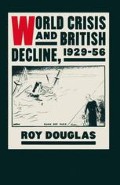Abstract
The world of early 1929 appeared to have recovered from the 1914 war, in the sense in which a man may be said to have recovered from the amputation of a limb. His life is no longer in imminent danger, he has adjusted himself to the loss, and he is going about his activities in the way in which he expects to continue for a long time to come.
Access this chapter
Tax calculation will be finalised at checkout
Purchases are for personal use only
Preview
Unable to display preview. Download preview PDF.
Notes
John Reed, Ten Days that Shook the World (New York; 1960) p. 190.
Statistical information based on tables in B. R. Mitchell, European Historical Statistics 1750–1975 (1980)
US Department of Commerce, Historical Statistics of the United States: Colonial Times to 1970 (1975).
See W. S. and E. S. Woytinsky, World Commerce and Governments (1955) pp. 276–7.
Author information
Authors and Affiliations
Copyright information
© 1986 Roy Douglas
About this chapter
Cite this chapter
Douglas, R. (1986). A Kind of Stability. In: World Crisis and British Decline, 1929–56. Palgrave Macmillan, London. https://doi.org/10.1007/978-1-349-18194-0_1
Download citation
DOI: https://doi.org/10.1007/978-1-349-18194-0_1
Publisher Name: Palgrave Macmillan, London
Print ISBN: 978-0-333-40579-6
Online ISBN: 978-1-349-18194-0
eBook Packages: Palgrave History CollectionHistory (R0)

